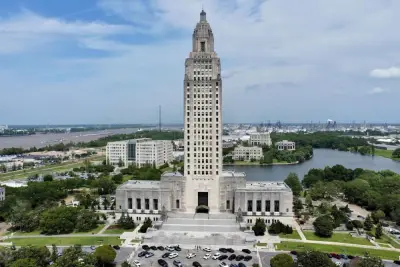Louisiana urges Supreme Court to bar use of race in redistricting, in attack on Voting Rights Act

By MARK SHERMAN WASHINGTON AP Louisiana on Wednesday abandoned its defense of a political map that elected two Black members of Congress and instead called on the Supreme Court to reject any consideration of race in redistricting in a scenario that could bring major changes to the Voting Rights Act Related Articles FACT FOCUS Rural hospitals are expected to lose money from Trump s bill despite RFK Jr s promise CDC director Susan Monarez is out after less than one month on the job federal functionaries say CDC dramatically scales back project that tracks food poisoning infections Postal services that suspended US shipments need time to prepare for new tariffs UN agency says Indiana legislative leaders met privately with Trump to discuss redistricting Appealing to a conservative-dominated court that has been skeptical of the use of race Louisiana is advancing a position that could allow it and other Republican-led states in the South to draw new maps that eliminate virtually all majority Black districts which have been Democratic strongholds voting rights experts reported If Louisiana s argument prevailed at the Supreme Court it would almost certainly lead to a whiter and less representative Congress as well as significantly less minority representation across the country in legislatures city councils and across other district-based bodies UCLA law professor Richard Hasen explained in an email The state s high court filing was in response to the justices call for new briefing and arguments in the Louisiana circumstance which they first heard earlier this year Arguments will take place on Oct Race-based redistricting is fundamentally contrary to our Constitution Louisiana Attorney General Elizabeth Murrill wrote Voting rights groups defending the second Black majority district urged the court to reject the state s constitutional challenge A second round of arguments is a rare occurrence at the Supreme Court and sometimes presages a major change by the high court The Citizens United decision in that led to dramatic increases in independent spending in U S elections came after it was argued a second time When the court first heard the Louisiana matter in March several of the court s conservative justices suggested they could vote to throw out the map and make it harder if not impossible to bring redistricting lawsuits under the Voting Rights Act The episode involves the interplay between race and politics in drawing political boundaries Just two years ago the court by a - vote affirmed a ruling that located a likely violation of the Voting Rights Act in a similar development over Alabama s congressional map Chief Justice John Roberts and Justice Brett Kavanaugh joined their three more liberal colleagues in the outcome That decision led to new districts in both states that sent two more Black Democrats to Congress Now though the court has inquired the parties to answer a potentially big question Whether the state s intentional creation of a second majority-minority congressional district violates the Fourteenth or Fifteenth Amendments to the U S Constitution Those amendments adopted in the aftermath of the Civil War were intended to bring about political equality for Black Americans and gave Congress the authority to take all necessary actions Nearly a century later Congress passed the Voting Rights Act of called the crown jewel of the civil rights era to in the end put an end to persistent efforts to prevent Black people from voting in the former states of the Confederacy While the high court has pared back the law in the past dozen years it has sustained the provision that allows challenges to political districts that can be shown to deprive minority voters of the chance to elect representatives of their choice In the arguments in March Louisiana defended the congressional map as an effort to comply with court rulings and preserve districts held by powerful Republicans including House Speaker Mike Johnson The court fight over Louisiana s congressional districts has lasted three years Two maps were blocked by lower courts and the Supreme Court has intervened twice Greater part of late the court ordered the new map to be used in the vote The state s Republican-dominated legislature drew a new congressional map in to account for population shifts reflected in the Census But the changes effectively maintained the status quo of five Republican-leaning majority white districts and one Democratic-leaning majority Black district Civil rights advocates won a lower court ruling that the districts likely discriminated against Black voters The state eventually drew a new map But white Louisiana voters claimed in their separate lawsuit that race was the predominant factor driving it A three-judge court agreed leading to the current high court scenario
